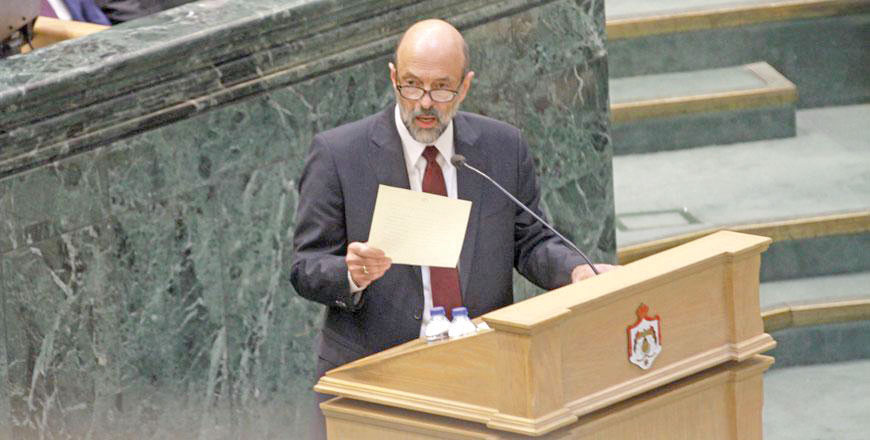AMMAN — Only 30 per cent of the public and 35 per cent of opinion leaders believe that the situation in Jordan is going in the right direction, a poll revealed on Wednesday.
The latest figures revealed a drop of 27 and 29 points respectively (grassroots and opinion leaders samples) from recent surveys that reflected higher approval ratings when Premier Omar Razzaz was appointed almost three months ago.
The approval ratings at that time stood at 55 per cent for the grassroots sample and 63 per cent for opinion leaders that believed the situation in Jordan was heading in the right direction.
The poll, conducted by the University of Jordan’s Centre for Strategic Studies (CSS), surveyed 1,822 Jordanian women and men over the age of 18, since the day of the formation of Razzaz’s government. It also surveyed a smaller group of 700 “opinion leaders”, including academics, intellectuals, media, business leaders and politicians.
CSS Director Musa Shteiwi told the press that several factors contributed to the decline in the government’s popularity.
The drop in the government’s popularity, according to Shteiwi, “could be attributed to the fact that people felt victorious with the resignation of [Hani] Mulki’s government and the personality of Razzaz has a clean history and he is well respected in Jordanian society, and the fact that the government had to deal with the income tax law which had a very negative attitude from the population in the past and present”.
“Although the government did some discussion regarding the tax law, people are still opposing the law because to some extent they feel it is the same as the previous law,” Shteiwi explained.
In June, Mulki had to step down following several protests by Jordanians over a draft tax law and an increase in the cost of crucial commodities.
In addition, Shteiwi said that the openness of communication between Razzaz and the public via social media and “the optimism he revealed in these communications helped increase the expectations of the public, but after three months people felt let down with their expectations from the prime minster”.
“The polls revealed a shift in the mood of the population similar to the mood [shift] that happened during Mulki’s government,” Shteiwi added.
Unemployment was one of the most pressing issues that needed to be tackled according to 23 per cent of Jordanians surveyed, followed by 21 per cent who pointed to a rise in the price of commodities and 14 per cent pointing to corruption.
Meanwhile, 47 per cent of opinion leaders said the general economic situation was the most important issue that should be addressed, followed by fighting corruption with 12 per cent, the polls revealed.
Of those surveyed, 49 per cent believed that the premier is capable of holding on to his responsibilities.
Another 40 per cent of the grassroots sample surveyed and 44 per cent of opinion leaders support a government reshuffle, while 18 per cent of the public and 16 per cent of opinion leaders supported a limited reshuffle.
Turning to the economic situation in the country, the polls indicated that only 10 per cent of the grassroots sample and 8 per cent of opinion leaders said the economic situation has gotten better in the past 12 months.
Opinion leaders and the public both polled at 25 per cent expressing optimism that the economic situation in Jordan will get better in the coming 12 months.
